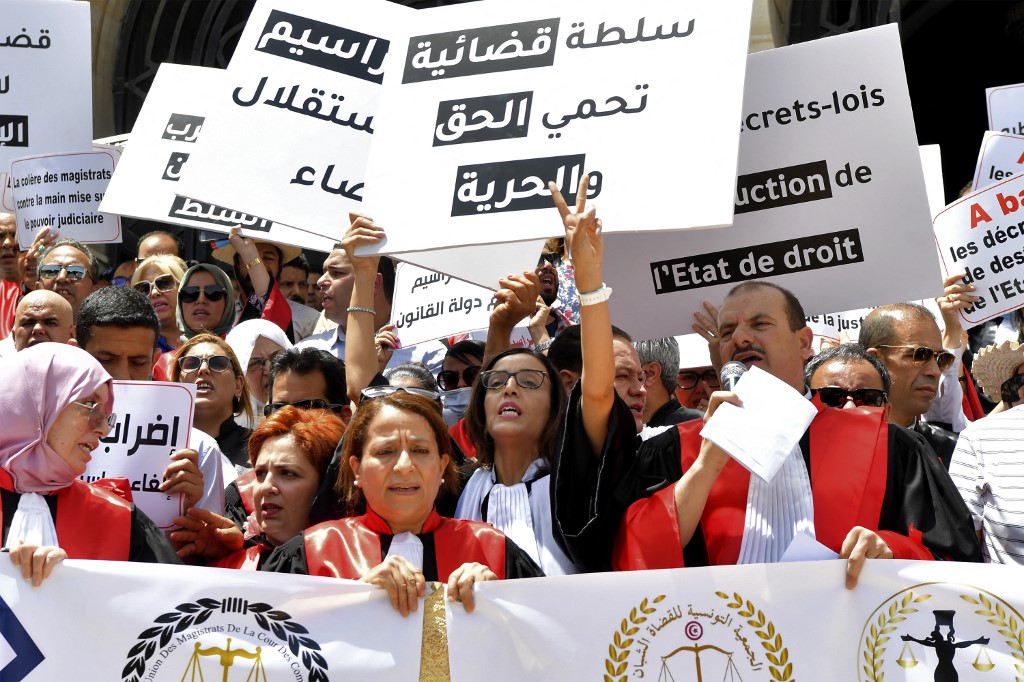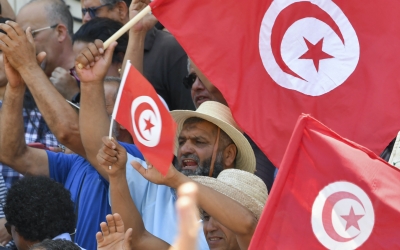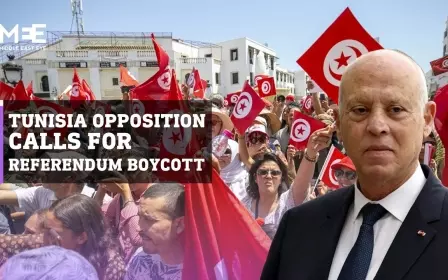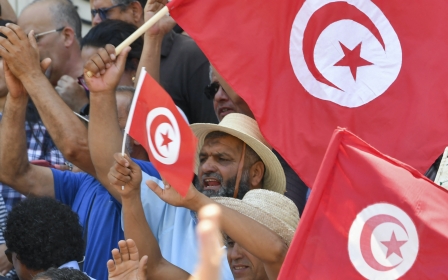To vote or not to vote? That is Tunisia's constitutional question
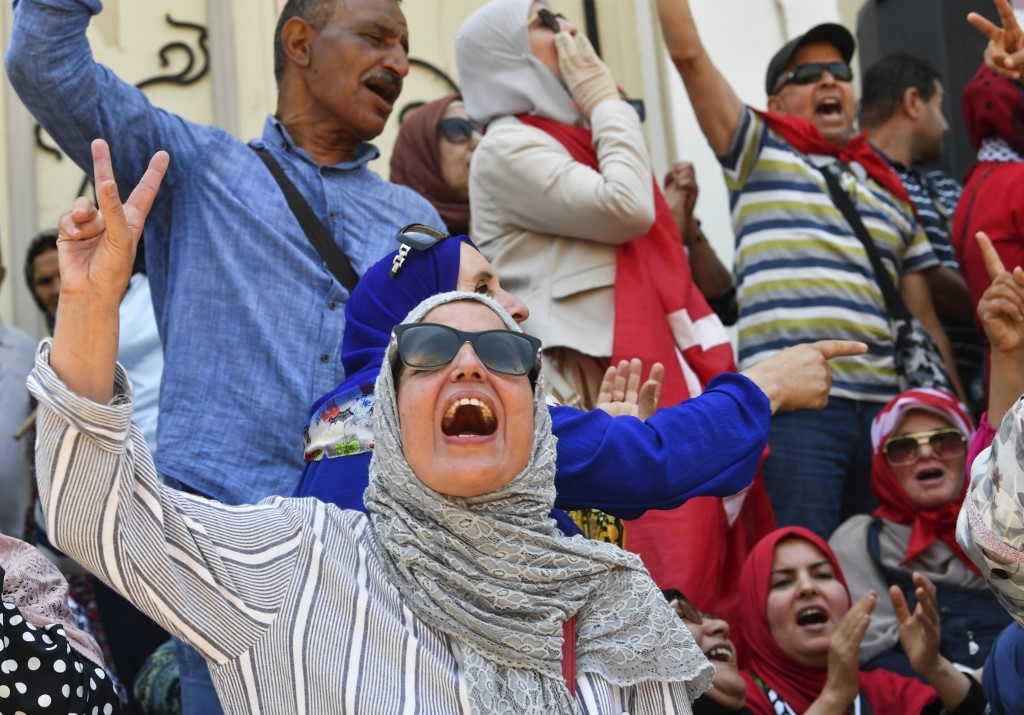
Tunisia’s opposition is torn between voting "no" and boycotting the constitutional referendum on 25 July, widely denounced as an attempt by President Kais Saied to enshrine his "one-man rule".
The date of the vote marks the first anniversary of Saied's seizure of extensive powers that saw him rule by decree, a move which his opponents have since branded "a constitutional coup".
Since his power grab, Saied has imposed numerous controversial measures including suspending parliament, shutting down the country's independent anti-corruption body, and sidelining the national election authority.
'Saied embarked on a solo tour, ignored all advice and did whatever he liked'
- Afek Tounes spokesperson, former Saied supporter
In early February, he dissolved the Supreme Judicial Council and granted himself control over the selection and promotion of judges.
The measures, the plans for which were first revealed by Middle East Eye, have been widely considered a setback for the pro-democracy revolution of 2011.
New MEE newsletter: Jerusalem Dispatch
Sign up to get the latest insights and analysis on Israel-Palestine, alongside Turkey Unpacked and other MEE newsletters
More recently, Saied has sought to rewrite the country’s first post-revolutionary constitution through a committee he handpicked in a process decried by many politicians and constitutional experts as undemocratic. But even after the draft was published, its authors declared that it had amendments that they had not approved.
Sadeq Belaid, the Saied-appointed head of the drafting committee, withdrew support for the charter after finding it had changed into a text that could lead to a "dictatorial regime".
"It has nothing to do with the text we drafted and submitted to the president," said the jurist.
Likewise, some political groups that initially supported Saied’s measures now find that he has gone too far.
They include the centre-right Afek Tounes party, which now calls for a "No" vote.
“We backed the intervention. In fact, we even proposed it. That is what separates us from the boycotters,” Anas Soltani, spokesperson for the Afek Tounes party, told MEE.
“We are closest to what Tunisians want,” Soltani claims, recalling polls showing at the time 85 percent of Tunisians supported the president’s seizure of vast powers.
However, while Afek Tounes and allies are thought to be part of Saied's proclaimed road to “true” democracy, the president swept away in a heartbeat all that had been painstakingly built up in the previous 10 years. They feel tricked, Soltani says. “Saied embarked on a solo tour, ignored all advice and did whatever he liked,” he told MEE.
Soltan explained that Saied, since 25 July, has extended his grip over virtually all governmental bodies, including the judiciary and the electoral commission. The new constitution, bringing most political power under Saied, is believed to be a paper version of the governing system he single-handedly put in place.
Illegitimate process
After a decade of democracy, marred by paralysing political infights, corruption scandals and prolonged economic slumps, Saied sidelined both the prime minister and parliament and assumed all governmental powers. His manoeuvres tore the country apart.
Across civil society groups and political parties, a division has risen between those who defended the measures as a way out of the multiple crises, and those who still refer to the intervention as a coup.
Those who call for a boycott believe the process itself is illegitimate. They include Ghazi Chaouachi, leader of the Attayar movement, the largest of five parties united in the anti-referendum campaign.
“Saied staged a coup, so all ensuing moves are illegal,” Chaouachi told MEE. “Saied is not entitled to call a referendum. He has destroyed our democracy and now he is imposing his constitution.”
But Afek Tounes spokesperson Soltani argues that a large turnout to vote "no" will make a difference.
“Just not showing up is a passive decision. Saied cannot override a mass 'no' vote. In such a case, we will demand his departure in an official statement afterwards.”
Boycotters, on the other side, exhort Tunisians not to show up in a “masquerade”.
Voting makes no sense, they claim, citing the clause in the constitution stipulating that it will take effect after the referendum whatever the outcome.
Former Ennahda minister Ahmed Gaaloul believes the solution “is not to join Saied’s game” by boycotting the vote.
“It’s better to ignore him. We fight our own battle,” Gaaloul told MEE.
Saied has dictated the plebiscite as the nation's priority, Gaaloul says, “But in reality, the country faces substantial problems he neglects, like its near bankrupt economy.”
“The idea of a mass 'no' vote is well-intentioned, but unrealistic,” he added. “Since Saied and his self-composed electoral commission don’t leave room for a counter campaign, convincing the masses of a 'no' is simply not going to happen.”
No time to waste
Recently, several anti-Saied groups, among them Afek Tounes, said their rallies and press conferences were being thwarted by Saied. Those parties also enumerated scores of findings that Saied himself has violated several electoral rules.
In the days of former president Zine El Abidine Ben-Ali, who was ousted after the 2011 revolt, Tunisians got accustomed to electoral fraud and manipulation, said Myriam, a Tunisian who has been advocating a boycott on her Facebook page.
“It is pure trickery. As before, 99.99 percent will vote 'yes',” Myriam told MEE. “My ‘no’ will turn into a ‘yes’.” The most effective strategy, Myriam added, “is to completely isolate Saied. He and his constitution are dangerous. His aim is to turn it into an Islamic republic, like Iran,” she said, referring to criticisms that the new draft adds “theocratic” references to religion that did not exist in the older versions.
Other Saied opponents also recall the era of Ben-Ali’s autocracy. “A new constitution should never be the decision of one individual. We have been there before,” Leila Horra Belkhiria told MEE.
“I’m wavering. Boycotting implies free space to Saied and his fans - it could have serious consequences in the long run. Instead, the opposition should unite to reject the referendum by voting ‘no’ or stopping the referendum from happening.”
With a few days to go, there are no indicators that this might happen. The opposition is fragmented, consisting of scattered groups pushing for a no vote and a divided boycott movement.
“Our internal divisions explain, in part, the country’s apparent smooth shift to an autocracy,” Chaouachi from the Attayar party says. “Parties face internal and external conflicts and we have no credible alternative to offer. But we can no longer afford these kinds of luxuries. The situation is dangerous. We are working hard to bridge the divides.”
Differing goals
Months of talks with the main pro-boycott opposition alliance, the National Salvation Front, home to former ruling party Ennahda, alongside activists have, however, yielded no visible results. Chaouachi lists a couple of reasons.
“Our goals differ, and we each have our own ideas about the post-Saied era.”
'There is no time to bicker about ‘no’ or a boycott. This constitution can lead us to dictatorship'
- Amine Snoussi, analyst
The talks are further complicated by the poor image of political parties, highlighted in the speeches of Saied, proclaiming the decennial democracy as “the black decade”.
Those disagreeing on the boycott or no vote are fighting the wrong battle, analyst Amine Snoussi said.
“There is no time to bicker about ‘no’ or a boycott. This constitution can lead us to dictatorship,” Snoussi told MEE.
“Those refusing to participate in the Saied process because it is illegal and the ‘no’ camp should unite to demand the cancellation of this illegal referendum, on this illegal constitution, promoted by an authoritarian president.”
Snoussi will vote "no", he said. “But I understand why people refuse to participate in a process organised by an authoritarian president who has no respect for the separation of powers, pluralism, and more generally, democracy.”
This article is available in French on Middle East Eye French edition.
Middle East Eye delivers independent and unrivalled coverage and analysis of the Middle East, North Africa and beyond. To learn more about republishing this content and the associated fees, please fill out this form. More about MEE can be found here.


